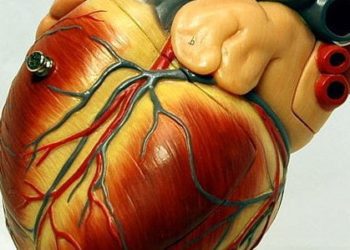The RIVAL trial: Radial vs femoral artery access for PCI [Classics Series]
Image: PD
1. The composite outcome of death, myocardial infarction, stroke, and non-CABG-related major bleeding did not differ between radial and femoral access for percutaneous coronary intervention
2. Radial artery access is associated with a significantly lower rate of vascular complications compared to femoral access
Original Date of Publication: April 23, 2011
Study Rundown: For patients with acute coronary syndromes (ACS), vascular access for percutaneous coronary intervention (PCI) via the femoral artery is associated with a substantial risk of bleeding, particularly at the access site. Vascular access via the radial artery may reduce bleeding risks since the site is more superficial and compressible. Observational studies suggest that radial access may also be associated with a lower risk of death and myocardial infarction (MI). The RIVAL trial was the first large, randomized, controlled trial that assessed whether radial access for PCI may be superior to femoral access. Radial and femoral access did not differ in the rate of the composite primary outcome, which consisted of death, MI, stroke, and non-CABG-related major bleeding (HR 0.92; 95%CI 0.72-1.17). Vascular access site complications, however, were significantly reduced with radial access compared to femoral. In particular, radial access was associated with a decreased risk of developing large hematomas and pseudoaneurysms requiring closure. Finally, there was a significant interaction between the primary outcome and the volume of radial PCIs performed by the medical center.
One potential limitation of the study is the study’s overall low rate of major bleeding, which may have prevented the detection of a significant difference in non-CABG-related bleeding due to radial versus femoral access. The rate of major bleeding is low compared to other studies, and may be due to the study’s use of experienced, high-volume interventional cardiologists whose technical skills may be superior to those of other cardiologists.
In summary, the RIVAL trial demonstrated that radial and femoral artery access for PCI are equally effective in managing ACS. Radial access, while potential more difficult to establish, may be preferable due to its significantly lower risk of vascular complications, as compared with femoral access.
Click to read study in The Lancet
In-Depth [randomized, controlled study]: The RIVAL trial was a randomized, parallel group, multicenter trial that was originally published in The Lancet in 2011. A total of 7,021 patients were enrolled in the trial and underwent randomization. Patients were eligible if they had a diagnosis of ACS and were planning to undergo PCI. Patients were excluded if they presented in cardiogenic shock, had peripheral vascular disease, or a history of previous CABG surgery. Recruited cardiologists were required to have expertise in both radial and femoral artery access, including at least 50 radial procedures. In the end, 3,507 participants were randomized to radial access and 3,514 participants were randomized to femoral access. The primary outcome was a composite of death, MI, stroke, and non-CABG-related major bleeding at 30 days. There was no difference in the occurrence of the primary outcome between the radial and femoral groups (HR 0.92; 95%CI 0.72-1.17). There was an observed interaction between the primary outcome and a medical center’s volume of radial access (HR 0.49, 95%CI 0.28-0.87). Radial access was associated with fewer vascular complications, including development of large hematoma (HR 0.40; 95%CI 0.28-0.57) and pseudoaneurysm needing closure (HR 0.30; 95%CI 0.13-0.71).
By Evan Chen and Andrew Cheung, M.D.
©2013 2minutemedicine.com. All rights reserved. No works may be reproduced without expressed written consent from 2minutemedicine.com. Disclaimer: We present factual information directly from peer reviewed medical journals. No post should be construed as medical advice and is not intended as such by the authors, editors, staff or by 2minutemedicine.com. PLEASE SEE A HEALTHCARE PROVIDER IN YOUR AREA IF YOU SEEK MEDICAL ADVICE OF ANY SORT.







